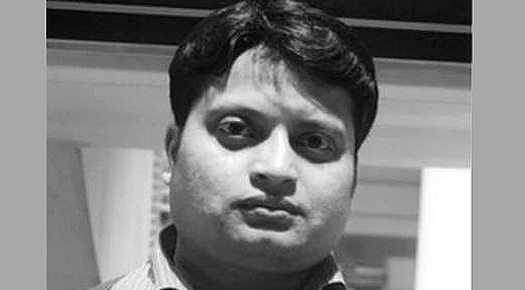
Attacks on atheist bloggers who are critical of Islam have developed a disturbing frequency in Bangladesh, with yet another gruesome killing that was carried out on May 12. Ananta Bijoy Das, 32, was hacked to death on Tuesday morning after he left home and was on his way to a bank where he worked. Police officials in the northeastern city of Sylhet said that four masked men carried out the attack, eventually hacking him to death with the help of cleavers and machetes.
Sylhet Metropolitan Police Commissioner Kamrul Ehsan explained that the attackers escaped after killing Das and since the incident took place during the early hours of the day, there were few to no witnesses at the scene by the time the police arrived.
However, the police did interview some of the people who were present at the spot at the time of the incident.
“It's one after another after another,” said Imran Sarker, who heads the Blogger and Online Activists Network in Bangladesh. “It's the same scenario again and again. It's very troubling.”
Das’ death is the third this year of any person that has posted articles critical of Islam on an online forum. In each incident, the attack has been carried out publicly in broad daylight. In March this year, blogger Washiqur Rahman was murdered by two men using meat cleavers just outside his home in Dhaka and a month earlier, blogger Avijit Roy was killed in a similar attack. These three victims are not the only ones to have paid a hefty price for their un-Islamic views. Over the last two years, many bloggers have lost their lives either to intended killings or under mysterious circumstances.
In 2014, Reporters Without Borders said that a group identifying itself as Defenders of Islam had issued a hit list of writers in Bangladesh who apparently oppose Islam.
“They listed 84 bloggers, mostly secularists. They listed 84 of them,” said blogger Asif Mohiuddin, whose name was on the list. “Nine of them are already killed and many of them have been attacked.”
Das was an atheist contributor to the blog, Mukto Mona (Free Thinkers), that had been founded by Roy. On the blog, where there are sections titled Rationalism and Science, most articles pitch scientific evidence against religious beliefs, and more often than not the latter usually fails to hold its ground. Even though Das was occasionally critical of religious fundamentalism and the attacks faced by secular thinkers, he was mostly concerned with promoting science over religion. He also served as the editor of a local magazine, Jukti (Reason), and wrote several books, including one based on the theories of Charles Darwin.
In 2006, Roy’s blog awarded Das the Rationalist Award for his insightful and courageous interest in spreading humanist and secular ideas and messages in a place that is not only remote but barely has a handful of rationalists.
“He was a voice of social resistance; he was an activist,” said Sarker. “And now, he too has been silenced.”
Immediately after his death, Das’ Facebook wall was flooded with messages of condolence and shock. Hundreds of protesters took to the streets of Sylhet to demand that the attackers be brought to book immediately.
“We've heard from Ananta's friends that some people threatened to kill him as he was critical of religion,” Das' brother-in-law Somor Bijoy Shee Shekhor said.
However, nobody has claimed responsibility for the attack.
“We are ashamed, brother Bijoy,” a supporter posted on Das' Facebook page.
“Is a human life worth so little? Do we not have the right to live without fear?” wrote another.
Police officials are investigating the recent deaths of all three writers but few have faith in the system and most believe that the culprits will go scot-free.
“One of the reasons it's come to this stage because a) they know they can get away with it. Anyone can get away with anything at this point,” said Shahidul Alam, another blogger. “There is no such thing as the rule of law. And despite these attacks, the government has taken no serious attempt to bring perpetrators to justice or investigate what's happened.”
Sweden was condemned for refusing to grant a visa to Das, who had been invited by the Swedish branch of PEN International to attend a fortnight long seminar on the freedom of speech and expression.
Reportedly, the Swedish Embassy rejected Das’ visa application on grounds that he “belonged to a category of applicants where there is always a risk involved when granting a visa that you will not leave Schengen area after the visit. Furthermore, the purpose of your trip is not urgent enough to grant you visa.”
According to local media reports, spokesperson for the Swedish Foreign Ministry Kent Oberg confirmed the rejection of Das’ visa application but refused to offer any further details. PEN International is now seeking a detailed and credible explanation from Sweden with regards to the refusal.
Additionally, Director General of UNESCO Irina Bokova called for trial and punishment of the murderers.
“I call on the authorities to ensure that those responsible for this killing are brought to justice,” Irina Bokova said in a statement. “Punishing such attacks is indispensable to maintain free public debate and free expression by media professionals and committed citizens alike.”
Bokova also voiced grave concern for the safety of citizen journalists in Bangladesh, more so since the country has an ever-dwindling population of outspoken voices and deaths like the ones that have taken place in the recent past only help to silence the remaining handful.
Photo Credits: Gatestone Institute
